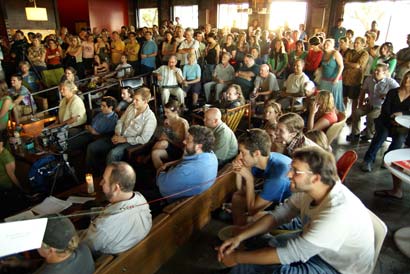
(Photo: Garrett Downen/Bus Project)
Despite the Portland Mercury’s well-intentioned efforts to make their Bikes vs. Cars debate a slug-fest, I’m happy to report that last night was anything but.
The venue was packed and from what I heard, most people said it was a success.
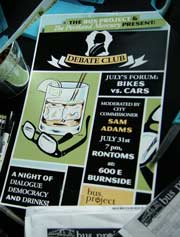
About 98% of the crowd rode bikes to the event and things were clearly stacked in favor of the a bike-centric perspective. However, that didn’t stop Mel Zucker (remember him?) from trying to make his points (even if they were based on outdated, national data).
My favorite quote from the night was Zucker repeatedly responding to ideas and questions about funding for various bike infrastructure and other projects as, “that’s typical Portland fantasyland.” Then Commissioner Adams — who showed up wearing a black gown over his suit — called Zucker out on some of his own dubious stats and said, “that’s typical Mel Zucker fantasyland.” The crowd of course got a good laugh out of this.
Even though Zucker has some interesting opinions about bicycles, he isn’t such a bad guy. On a few points, he was actually on the same page as his debate counterpart, BTA interim director Scott Bricker.
Bricker acknowledged Zucker’s perspective several times throughout the evening and gave him credit for “thinking outside the box” and having some innovative ideas.
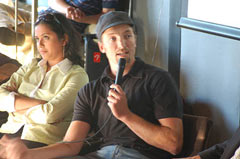
(Photo: Portland Mercury)
The other panelist on the car side of the discussion was Sreya Sarkar of the Cascade Policy Institute. She advocates for public funding of automobiles to help lift low-income people into better jobs and better lives (think of it like the Community Cycling Center’s Create-a-Commuter program only with cars).
The Mercury’s photo above doesn’t do her justice. From what I heard last night she seems like a completely reasonable person with good intentions. After the debate was over, I was happy to see BTA Safe Routes to School staffer Angela Koch approach her to exchange contact information.
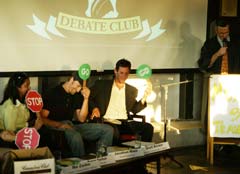
to vote on a series of questions.
(Photo: Garrett Downen/Bus Project)
There weren’t really any bombs dropped that I can remember and the dialogue never got personal between the panelists.
For me, the biggest take-away from the night was the eloquence and passion displayed by Scott Bricker. For Bricker, the debate could not have come at a better time. He was just named as the BTA’s new leader last week and this event gave people in the community a chance to see what he’s all about.
His answers and rebuttals showed a passion for his work and were met with cheers of approval from the crowd. He displayed candor, intelligence, humor, charisma, and a willingness to take an open-minded, cooperative approach to getting more people on bikes.
I’ve got an interview with Bricker I’ll publish later today. That interview, combined with his performance last night give me a renewed hope for the BTA, and for the bike movement in Portland.
Big thanks to the Portland Mercury and the Bus Project. They are both doing great work. To pack a room full of young people on a sunny evening for a conversation about transportation choices is no small feat.
For more photos from last night, check out this post on the Mercury blog.



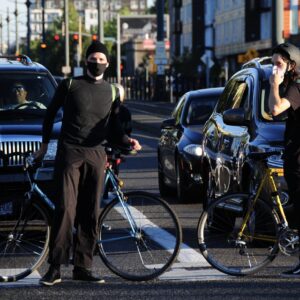


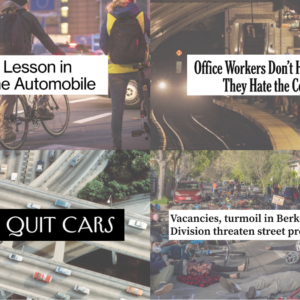
Thanks for reading.
BikePortland has served this community with independent community journalism since 2005. We rely on subscriptions from readers like you to survive. Your financial support is vital in keeping this valuable resource alive and well.
Please subscribe today to strengthen and expand our work.
The two car advocates walked into a lion\’s den. I was stoked on how much the bicycle logic was completely demolishing the car logic, but I started to feel bad for how stupid the crowd was making Mel feel (even though he actually was one of the most inarticulate persons I had ever experienced at a debate). Even Sam Adams was talking to him in a harsh and belittling manner. Jonathan, I thought you handled yourself quite well. I appreciated how nice you were to the Sreya. You and Scott frickin\’ rocked the stats and facts. You were concise, sure, and intelligent up there, giving much hope to those who need bike leaders in our community. You did us proud.
\”Then Commissioner Adams — who showed up wearing a black gown over his suit —\”
At first when I read this, I thought you meant Sam was making an argument for sexy bike commuter fashion (or I was curious what event he was attending after this one). I am assuming though he was moderator for this event, so the gown was more of the courtroom variety?? Pictures??
Jonathan:
Congrats on your performance. I missed it, but heard that you aquitted yourself well.
I hope you were able to make the point that it\’s not really about cars vs bikes, but really \”cars only\” vs \”cars, bikes & any other appropriate form of transport, all sharing the road.\”
Also, when is Sam Adams going to announce his run for mayor, and where can we sign up to help?
It was very interesting. The debate was definitely not as confrontational as I though it would be.
Yeah, Mel is kind of odd but he does have some valid points. I never did attempt to submit my question for Mel: \”Exactly how many people are in the Oregon Transportation Institute?\”
The gown was actually a graduation type. He mentioned that they gave it to him there.
Although not surprising, it was completely one-sided debate. I also felt bad for Mel and Sreya who were brave enough to come and argue their points amongst all of us. Mel really was asking to have his knuckles smacked though, Sam should have made him go sit in the corner on more than one occasion.
I\’m very glad we could have this talk. Even though I doubt much change will come of it, it is strengthening to see everyone\’s passion for finding a solution to the broken system. That, and Matt Davis was spot on — there were some daaamn sexy bikers there last night.
Mel did have a good point about jitneys (shared taxis). I lived in a country for a long time which still uses those as a major transportation method. In fact, using them was the main reason I started learning the local language; they don\’t rely on street names much there and need clear directions on where to go (they had no problem going a bit off route).
Hello Jonathan,
Thanks for presenting a balanced report of the debate. I wish people understood it slightly better that the \’biker-lion\’s den\’ and \’car-supporter lion\’s den\’ dichotomy is overrated and childish. The kind of population my program deals with does not even get to participate in these kind of debates. I wish they could. I wish you all the best with your endevours.
Sorry I missed the debate, and glad so many bike advocates were there. Still, although I\’m glad to get our fact-supported pro bike positions out there to demolish the naysayers, events like these remind me of those PBS NewsHour \”debates\” between a timid journalist advocating a position held by the vast majority of people/scientists/ whatever, and a right-wing nut case from some corporate-funded policy \”institute\” (usually consisting of about five paid-off ideologues), leaving the implication of two equally justifiable sides, when in fact one \”side\” is held by only a few, self-interested people with big money or political support. So as asked above, how many people do this tiny ideological libertarian think tank and a crank like Zucker represent, vs. the thousands of current and wannabe (if the infrastructure were sufficient) Portland bikers? Why is one side with so little support in numbers or reason given equal time against the vast preponderance of reality-based people who favor more diverse, environmentally friendly transport options like bikes? I\’m all for informed debate, but I just hope people who don\’t know better don\’t come away with the mistaken impression that these two \”sides\” are somehow equal.
I\’m new to even knowing about your program, Sreya. Where are the target regions for the Wheels to Wealth program?
brettoo –
Are there really no \”corporate funded\” left wing think tanks?
Both \”sides\” in this debate (though there are probably more \”sides\” out there that were not represented) are equal because we need to value a diversity of views regardless of whether one view has a majority or not. You can\’t silence one party because they represent only X% of people. It\’s kind of like how campaigning for gay rights protects a minority from a hostile majority.
Portland is larger than close-in southeast so there may be quite a few (in the past referred to as the \”silent majority\”) people out there who believe that Zucker does speak for them.
As for people \”not knowing better\” and who come away with the \”mistaken impression\” that one of the sides is equal to the other, be careful that you don\’t fall into the trap of knowing what is best for people regardless of their own judgement. You may end up advocating to amend the Constitution to read, \”All animals are equal, but some are more equal than others.\”
I hope that last night\’s debate has encouraged people to find common ground and realize there is more to this issue than appears on the surface (Ms. Sarkar\’s work at CSI is a good example).
I enjoyed last night\’s \”debate,\” though it was so only in the loosest sense of the word. Ms. Sarkar\’s presentation was interesting and I don\’t think it sounds like a bad program at all, from what I could glean. But it doesn\’t really belong in a \”bike vs. cars\” forum because no one seriously thinks cars are going anywhere anytime soon, and no one has any immediate transit solutions for those who can\’t afford to live along major public transit routes or close enough to all the goods & services they and their families need without access to an automobile. Anyone who thinks bikes are going to solve systemic housing, income disparity, and infrastructure problems is living in one of Zucker\’s fantasylands. And Zucker — well, amusing, but as already mentioneed, stunningly inarticulate. It would have been a better forum all around if there had been some serious pro-auto folk and viewpoints represented. While it was great finally to see you, JM, in person, and while Scott Bricker was every bit as impressive as your summary indicates, I\’m already in the choir you preach to. I\’d like to have heard a more serious and developed presentation of the other side\’s serious arguments against and objections to increasing resources for biking as part of the transport plan.
Really, AAA should have been there. More than a healthy share of those roadside assistance member dues go to DC to lobby for highways, highways, and highways only. There is a pro-auto group if ever there was one. Zucker is an eccentric and CSI has not automotive policy like AAA does.
Jonathan is right, there really isn\’t a \”car vs. bike\” debate but more the clash between a nostalgic though inaccurate vision of the past versus current efforts to find practical, affordable solutions to very challenging problems of growth, peak oil and climate change–all in a time when transportation dollars are drying up.
I don\’t know Mr Zucker nor his group beyond the occasional letter to the editor but I was pleased to nominate Ms Sarkar to the Transportation Policy Alternatives Committee of Metro because she brought an important and missing perspective, namely that of low income people who face great barriers to getting better jobs and/or education because of lack of good transportation in their communities.
I was also transported back in time to 1992 when KATU Town Hall hosted a similar forum on the air, live. The most telling moment was when the president of the Portland Hot Rod club said that his family drove into Portland with their bikes from their home in Vancouver because the roads were safer to ride on in Portland and they liked to ride bikes (and they liked to tinker with cars).
As I said, I\’m glad there was a debate, so that different sides could be aired and compared, but another reason the whole bikes vs. cars idea is specious: most of us probably use both, along with buses, streetcars, Max, and our own two feet. Last week, I pulled a first for me: using all of the above in the same afternoon! The debate should really be about assuring choices and options and the best ways of getting Portlanders where we need to go, not necessarily about one particular method vs. another. For decades, we\’ve endured mostly a monoculture strategy — cars — and now we need to diversify.
Isn\’t it cool that so many people here turn up for debates on transport issues, not just live but also in the newspapers and online forums? I\’m proud to live in a city where so many of us think and care about these urban planning issues so deeply, rather than leaving these crucial decisions in the hands of developers and traffic engineers.
All I ask in the car .vs. bike discussion is that cars not run me over. I believe I have a responsibility to myself and to car drivers to make myself visible by wearing bright yellow or orange and by using flashing lights. I believe that a car driver has a responsibility to not hit me if he/she can see me. I also believe I have a responsibility to stay to the right so cars can pass on my left, unless I am in the lane to make a left turn, etc.
Car drivers, I\’ll try to make myself visible with lights and yellow clothes. Please keep an eye on me until you are past me so you don\’t hit me.
Car drivers, if I\’m on a country road, going 5 mph up a hill, don\’t get behind me and go 5 mph all the way up the hill. Move your car over to the left so your left tires are on the yellow line and then go by me. Do not get in the left lane and blow by me all the way to the top of the hill where you might cause a head-on collision if a car comes over the hill suddenly. I\’ll do my part to stay as far to the right as I can – do your part to safely pass and get around me.
In the city, I do recommend a grid of \”bike only\” streets with exceptions for residents of those streets. People will fight to get their street chosen to be a \”bike only\” street. I guarantee it.
I also recommend laws so bikes can treat stop signs as yields if it is safe to do so, but bikes must treat stop signs as stop signs IF there are other vehicles at that stop sign at the same time.
Also, I recomend laws so bikes can treat stop lights as stop signs when they can go safely and not interfere with traffic that has the green light.
Thanks a lot Rex, for your appreciation and understanding of the Wheels to Wealth mission.
My program is committed to expand the transportation options available to the \’working poor\’ in Oregon. A car works for a section of this population because of their occupational and family needs. But once they figure out how they can use alternative modes of transportation and if it is convenient for them, they will naturally make a shift to biking and vanpooling. But they essentially need to reach that \’take off\’ stage where they would be in a postion to choose. Most low-income workers don\’t have much of choice or control over anything, including where they live and what job they take up and sometimes there is a substantial geographical distance between the two.
For all those who are interested in knowing about the Wheels to Wealth program can visit my webpage:
http://www.cascadepolicy.org/?page_id=252
I would like to add here that Community Cycling Center also has a program for low-income adults. Here is the link to their webpage:
http://www.communitycyclingcenter.org/index.php/programs/create-a-commuter/
Both these programs aim at giving the low-income population access to mobility.
Doesn\’t really sound like it was much of a debate to me.
I see cars with bikes on the roof racks all the time. How many mountain biking enthusiasts have the time and inclination to ride to the Mount Hood National Forest to ride trails?
How many bikers drive to work in the really bad weather?
And how many bikers with kids bike their kids to school versus using their car or a carshare car?
Seems to me most of us are on both sides of this debate.
Of course, I\’ve not begun to address the fact that we all depend on truck freight, fire and ambulance service, pizza delivery, etc….
And I disagree re: the debate not devolving into the personal. Sam Adams in his attention seeking get up sounds as if he took a cheap shot with his comment about Mr. Zucker.